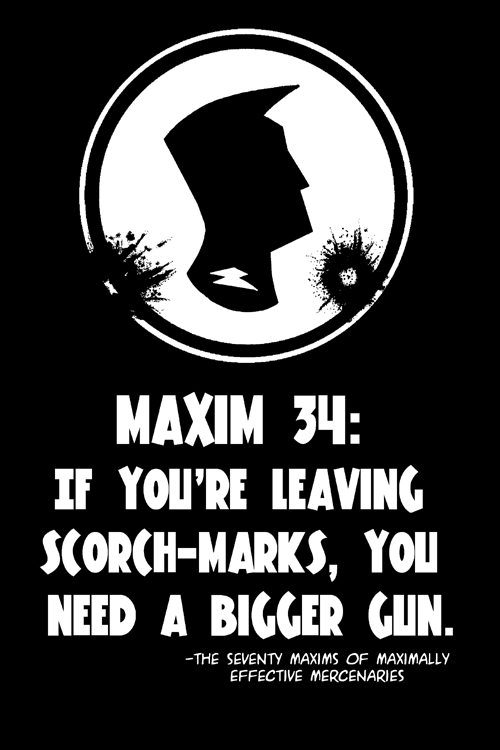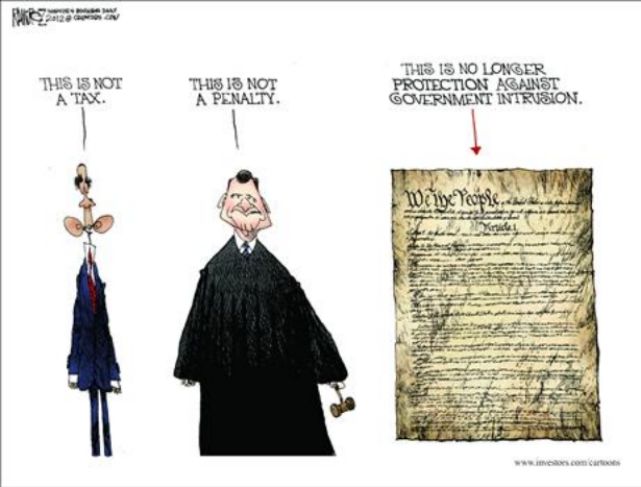
Actually, I’m kind of fond of Maxim 11:
Everything is Air-Droppable at Least Once.
but this one is pretty good, and should be in time for the Rendezvous.
Ordering information is available here.
The Smallest Minority on earth is the individual. Those who deny individual rights cannot claim to be defenders of minorities. – Ayn Rand

Actually, I’m kind of fond of Maxim 11:
Everything is Air-Droppable at Least Once.
but this one is pretty good, and should be in time for the Rendezvous.
Ordering information is available here.
At my last job, the lead engineer on the project I was involved in was about five years older than me. Peter was divorced, with grown children. He had a Harley he loved to ride, an old house he had recently purchased, gutted and was remodeling, and a real zest for life. He was careful (but not obsessive) about what he ate, he exercised regularly and took pretty good care of himself.
I liked the guy. He was an early and active member of Architects and Engineers for 9/11 Truth, and we had several long discussions on that topic, but we also talked about other things. He had a wicked sense of humor.
On Tuesday, June 26 at about 6AM he was out taking his morning walk when a 68 year old man driving a Toyota struck and killed him. He would have been fifty-five on July 17. I found out about it today.
Just. Damn.
Today’s Quote of the Day comes from Zombie’s review of George Lakoff’s new The Little Blue Book: The Essential Guide to Thinking and Talking Democratic:
For years I have wondered to myself: Is there anyone at the controls of leftist ideology? Sure, there are millions of Democratic voters and run-of-the-mill vaguely liberal Americans, but those people are the recipients of the message-control and the talking points. And then there are the pundits and the talking heads, but many of those people seem like automatons, repeating the instructions given to them on teleprompters and JournoLists. Behind them all must be the true masters, the deep thinkers, the philosophers. Lakoff is supposed to be one of those people behind the scenes, directing strategy. In fact, if you believe his own self-promotion, he is the guy behind the curtain, issuing magisterial instructions on how to engage in political warfare. So I had high expectations for The Little Blue Book.
But then I read it, and its hollowness left me flummoxed. It’s not just that there’s no there there; it’s that he elevates therelessness to liberalism’s pre-eminent virtue. Sloganeering had replaced introspection.
I finished the book with the rather unnerving conclusion that no one remains at the wheel of the Good Ship Liberalism, that it rides the political currents, adrift.
RTWT.
You know, I thought this was clever (albeit spelled worng) when it was done here near Tucson last November:

But I think I like the way some Alaskans think even better:

The Constitution is not an instrument for the government to restrain the people, it is an instrument for the people to restrain the government – lest it come to dominate our lives and interests. — Patrick Henry
The Constitution is not neutral. It was designed to take the government off the backs of people. — William O. Douglas
I know no safe depository of the ultimate powers of the society but the people themselves; and if we think them not enlightened enough to exercise their control with a wholesome discretion, the remedy is not to take it from them but to inform their discretion by education. This is the true corrective of abuses of Constitutional power. — Thomas Jefferson
The greatest threat to our Constitution is our own ignorance of it. — Jacob F. Roecker
A constitutional democracy is in serious trouble if its citizenry does not have a certain degree of education and civic virtue. — Phillip E. Johnson
The strength of the Constitution lies entirely in the determination of each citizen to defend it. Only if every single citizen feels duty bound to do his share in this defense are the constitutional rights secure. — Albert Einstein
Let the American youth never forget, that they possess a noble inheritance, bought by the toils, and sufferings and blood of their ancestors; and capable, if wisely improved, and faithfully guarded, of transmitting to their latest posterity all the substantial blessings of life, the peaceful enjoyment of liberty, property, religion, and independence. The structure has been erected by architects of consummate skill and fidelity; its foundations are solid; its compartments are beautiful as well as useful; its arrangements are full of wisdom and order; and its defenses are impregnable from without. It has been reared for immortality, if the work of man may ever justly aspire to such a title. It may, nevertheless, perish in an hour by the folly, or corruption, or negligence of its only keepers, THE PEOPLE. Republics are created by the virtue, public spirit, and intelligence of the citizens. They fall, when the wise are banished from the public councils, because they dare to be honest and the profligate are rewarded, because they flatter the people, in order to betray them. — Joseph Story
At the constitutional level where we work, 90 percent of any decision is emotional. The rational part of us supplies the reasons for supporting our predilections. — William O. Douglas
It is literally true that the U.S. Supreme Court has entirely liberated itself from the text of the Constitution. We are free at last, free at last. There is no respect in which we are chained or bound by the text of the Constitution. All it takes is five hands. — Antonin Scalia
I believe the Court has no power to add to or subtract from the procedures set forth by the founders…I shall not at any time surrender my belief that the document itself should be our guide, not our own concept of what is fair, decent, and right. — Hugo L. Black
We do not sit as a superlegislature to weigh the wisdom of legislation. — William O. Douglas
A law can be both economic folly and constitutional. — Antonin Scalia
The makers of our Constitution undertook to secure conditions favorable to the pursuit of happiness… They sought to protect Americans in their beliefs, their thoughts, their emotions and their sensations. They conferred, as against the government, the right to be let alone, the most comprehensive of the rights and the right most valued by civilized men. — Louis D. Brandeis, Olmstead v. United States, (1928)
It is not the function of our Government to keep the citizen from falling into error; it is the function of the citizen to keep the Government from falling into error. — Robert H. Jackson, American Communications Association v. Douds (1950)
Experience should teach us to be most on our guard to protect liberty when the Government’s purposes are beneficent. Men born to freedom are naturally alert to repel invasion of their liberty by evil-minded rulers. The greatest dangers to liberty lurk in insidious encroachment by men of zeal, well-meaning but without understanding. — Louis D. Brandeis, dissenting, Olmstead v. United States (1928)
The best laws cannot make a constitution work in spite of morals; morals can turn the worst laws to advantage. That is a commonplace truth, but one to which my studies are always bringing me back. It is the central point in my conception. I see it at the end of all my reflections. — Alexis de Tocqueville
As nightfall does not come at once, neither does oppression. In both instances, there’s a twilight where everything remains seemingly unchanged, and it is in such twilight that we must be aware of change in the air, however slight, lest we become unwitting victims of the darkness. — William O. Douglas
The Press was protected so that it could bare the secrets of the government and inform the people. Only a free and unrestrained press can effectively expose deception in government. And paramount amoung the responsibilities of a free press is the duty to prevent any part of the government from deceiving the people. — Hugo L. Black, New York Times V US (1971)
Our new Constitution is now established, and has an appearance that promises permanency; but in this world nothing can be said to be certain, except death and taxes. — Benjamin Franklin
The power to tax involves the power to destroy. — John Marshall
If the provisions of the Constitution can be set aside by an Act of Congress, where is the course of usurpation to end? The present assault upon capital is but the beginning. It will be but the stepping-stone to others, larger and more sweeping, till our political contests will become a war of the poor against the rich; a war growing in intensity and bitterness. — Stephen J. Field, Pollock v. Farmers Loan & Trust Co. (1898)
The turn will come when we entrust the conduct of our affairs to men who understand that their first duty as public officials is to divest themselves of the power they have been given. It will come when Americans, in the hundreds of communities throughout the nation, decide to put the man in office who is pledged to enforce the Constitution and restore the Republic. Who will proclaim in a campaign speech: “I have little interest in streamlining government or in making it more efficient, for I mean to reduce its size. I do not undertake to promote welfare, for I propose to extend freedom. My aim is not to pass laws, but to repeal them. It is not to inaugurate new programs, but to cancel old ones that do violence to the Constitution, or that have failed in their purpose, or that impose on the people an unwarranted financial burden. I will not attempt to discover whether legislation is ‘needed’ before I have first determined whether it is constitutionally permissible. And if I should later be attacked for neglecting my constituents’ ‘interests,’ I shall reply that I was informed their main interest is liberty and that in that cause I am doing the very best I can. — Barry Goldwater
We the people are the rightful masters of both Congress and the courts, not to overthrow the Constitution but to overthrow the men who pervert the Constitution. — Abraham Lincoln
Liberty lies in the hearts of men and women; when it dies there, no constitution, no law, no court can save it. While it lies there, it needs no constitution, no law, no court to save it. — Learned Hand
The liberties of the American people are entrusted to the whole of the people. Courts can delay, courts can warn, or, as with the Warren Court, they can be something to fear. But liberty must be won continually; it is not something you can win once and go back to sleep. As we are finding more and more.
Freedom is not free. Free men are not equal. Equal men are not free. And eternal vigilance is the price of liberty. Those clichés were once more than clichés and slogans; they were learned in the cradle and nurtured in grade school. We have forgotten them, and for some they are corny old clichés. They are not. They are the axioms of liberty. — Jerry Pournelle, Chaos Manor
UPDATE: Another one from Jerry from an earlier post:
What Mr. Roberts has seen is that a law so badly framed that it has internal contradictions and which mandates colossal new taxes while handing over nearly 20% of the national economy to federal bureaucrats has passed the House and Senate and has been signed by a President who purports to be an expert on Constitutional Law by dint of having been a lecturer on the subject at the University of Chicago as well as the President of the Harvard Law Review; and despite the obvious defects of this law, four Justices were eager to approve it. The whole course of the United States turns on the survival of five men. If one of them goes, so does the Constitution.
The old model of Congress messing with the Constitution and the Court trying to save it no longer works. We have gone too far down the road to serfdom, and if we continue there will be no turning back. The Courts cannot perpetually resist the political departments. If the Constitutionalists among us cannot regain control of the political branches, what we know as the Constitution of 1789 will be gone, irretrievably gone; it takes only one more liberal Justice.
Whereupon Mr. Roberts has thrown this question to the people. Is this the way you want to go? If so, confirm those who posed it. If not, turn them out. You have one more election to accomplish this. If Mr. Obama has four more years, the chances are good that he will be able to add one more to the Court, and there will be no turning back.

I’m fairly certain this is what is in every bathroom in the Capitol building, and quite possibly the Whitehouse:



I got these in an email a few minutes ago. That second one is Quote of the Day. I suspect you’ll be seeing them pop up elsewhere.
Blogger-on-hiatus Jed Baer emailed me yesterday with a link to someone in need. (I helped Jed out a few years ago.) Fellow blogger Jeff Borland of The Poor Farm, “Jeffro” is his nom de plume, has lost pretty much everything he owned in a house fire, including his precious cat Rooster and almost all of his guns. People are pitching in to help, and the blogosphere is also responding as only we can.
I’m reminded of September, 2005 when Mostly Cajun lost his home, possessions and cats to a fire after Hurricane Rita swept through his hometown.
Jeffro writes:
As for myself, there are two things that are bothering me. One – I cannot understand how I deserve all this help and largess. I don’t think I’m much different than anyone else, but I’m hearing that I’m not. Apparently my pal who wants to rent to me and my Cuz got together and figured this might just be a way for me to see just how good people could be, and teach me to take it. I’ve always been a do it yourselfer. Nope, don’t need no help doin’ that thang. Hate to bother ya, so I’ll do it myself.
Well, I cannot survive without sacrificing that kind of thinking.
Most of us on this side of the fence are fiercely independent. We don’t want handouts, we don’t want to be a burden. But there’s a difference between accepting help from friends and taking government handouts. One is voluntary, the other is taken at (implied) gunpoint and distributed at best inefficiently and at worst corruptly. Jeffro is getting immediate housing assistance from friends. Mostly Cajun got a FEMA trailer – after more than a month and a lot of runaround.
“Charity” is defined by Webster’s as “benevolent goodwill toward or love of humanity” and “generosity or helpfulness especially toward the needy or suffering.” You’ll note, it doesn’t say a thing about “compulsory.”
If you are feeling charitable, you can contribute to Jeffro’s recovery fund.
We form societies because, as much as we want to, we can’t always do it all by ourselves. I have to say, in my fifty years of life the society of bloggers is the finest one I have ever belonged to.
Walter Russell Mead rewrites the Declaration of Independence as it would have been approved by today’s Progressives. RTWT.
Oh, and happy Independence Day. Let’s hope there’ll be another one next year.